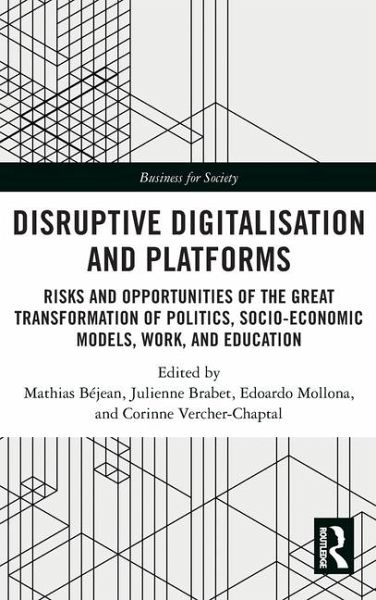
Disruptive Digitalisation and Platforms
Risks and Opportunities of the Great Transformation of Politics, Socio-economic Models, Work, and Education
Herausgegeben: Béjean, Mathias; Brabet, Julienne; Mollona, Edoardo; Vercher-Chaptal, Corinne
Versandkostenfrei!
Versandfertig in 6-10 Tagen
138,99 €
inkl. MwSt.
Weitere Ausgaben:

PAYBACK Punkte
69 °P sammeln!
This book provides an overview of the opportunities and risks of digitalisation and the platforms that embody it and constitute society's new infrastructure. From a management point of view - defined here as the steering of organised and finalised collective action - understanding this major socio-technical disruption is paramount. The book helps to comprehend its main players, such as the American GAFAM, their power and its sources, their architecture, and their impact on different industries and professions, labour markets, companies, and education.Responding to the dominance of tech giants,...
This book provides an overview of the opportunities and risks of digitalisation and the platforms that embody it and constitute society's new infrastructure. From a management point of view - defined here as the steering of organised and finalised collective action - understanding this major socio-technical disruption is paramount. The book helps to comprehend its main players, such as the American GAFAM, their power and its sources, their architecture, and their impact on different industries and professions, labour markets, companies, and education.
Responding to the dominance of tech giants, numerous initiatives are striving to regulate their influence, safeguard democratic sovereignty, promote fair competition in the digital sphere, and employ frugal digitalisation methods to counteract detrimental aspects of these "oligopolistic" platforms. In essence, shouldn't the overarching aim of digitalisation be to foster community development, strengthen individual and collective capabilities, and preserve the environment, while producing goods and services to meet shared societal interests? Throughout the four sections of this book and its 16 chapters, actors in the digital process and/or academics provide analyses and illustrations of the great digital transformation, examining the ways in which socio-technical advances can be created or used for the benefit of all, while avoiding major risks.
Responding to the dominance of tech giants, numerous initiatives are striving to regulate their influence, safeguard democratic sovereignty, promote fair competition in the digital sphere, and employ frugal digitalisation methods to counteract detrimental aspects of these "oligopolistic" platforms. In essence, shouldn't the overarching aim of digitalisation be to foster community development, strengthen individual and collective capabilities, and preserve the environment, while producing goods and services to meet shared societal interests? Throughout the four sections of this book and its 16 chapters, actors in the digital process and/or academics provide analyses and illustrations of the great digital transformation, examining the ways in which socio-technical advances can be created or used for the benefit of all, while avoiding major risks.














